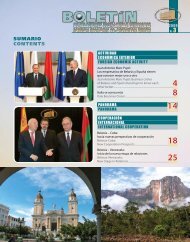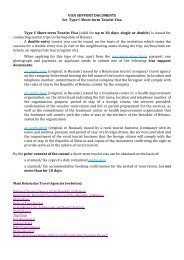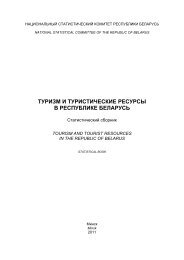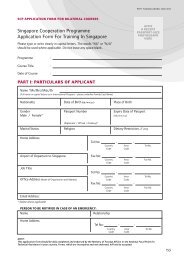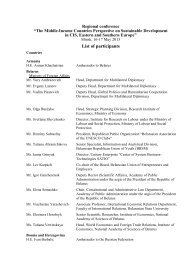Human Development Report 2013 - UNDP
Human Development Report 2013 - UNDP
Human Development Report 2013 - UNDP
You also want an ePaper? Increase the reach of your titles
YUMPU automatically turns print PDFs into web optimized ePapers that Google loves.
through the UN <strong>Development</strong> CooperationForum. Despite signatories’ commitment totransparency, the outcome document doesnot contain any other time-bound measurablecommitments or targets to which citizens canhold them to account.The post-Busan architecture has yet totake shape. But some intermediate prioritieshave surfaced. One is for traditional donorsto meet their commitments from the 2005Group of Eight Gleneagles summit to increaseaid and to deliver on better coordination andalignment. 20 Traditional donors can also workwith emerging donors, who can contributeknowledge and experience from a developingcountry perspective. The United Nations, withits universal membership, is well positionedto engage partners from the South in such trilateraldevelopment cooperation through theUN <strong>Development</strong> Cooperation Forum. Oneof the main tasks is to achieve better alignmentbetween North–South and South–South developmentcooperation and global norms.The Busan agreement marks a first step in reshapingdevelopment cooperation so that it canbe more effective and better harness the potentialof emerging countries. As with other globalpublic goods, once common understanding isreached at the global level, operationalizing theprinciples can in most cases be decentralized tonational governments using the agreed commonpolicy frameworks. Take the MillenniumDeclaration of September 2000 and the globalagreement on the Millennium <strong>Development</strong>Goals that eventually emerged. Agreementon these goals gave impetus to a wide rangeof activities and institutions by highlightinga simple truth: enhancing the capabilities ofpeople and advancing the development of allsocieties are important global public goods. 21The actual progress in the achievement of thesegoals has been very much at the country level,through national initiatives and ownership.Better representationfor the SouthThe current institutions and principles for internationalgovernance require rethinking or atleast recalibrating to accommodate the growingdiversity in voice and power and to sustainlong-term development progress. Many weredesigned, long before the rise of the South, fora post–Second World War order that does notmatch contemporary reality.As a consequence, these institutions greatlyunderrepresent the South. Voting quotas in theBretton Woods institutions are weighted towardscountries in the North, despite changingglobal economic realities. For example, China,which is the world’s second largest economyand holds more than $3 trillion in foreignreserves, has had a smaller voting share in theWorld Bank than both France and the UnitedKingdom.Similarly, the United Nations SecurityCouncil makes decisions on global peace andsecurity with a permanent membership thatreflects the geopolitical structure of 1945. Atthe 2012 United Nations General Assemblymeeting in New York, several heads of governmentfrom the South again voiced theirlong-standing demands for permanent seats onthe council for Africa, Latin America and suchunrepresented developing country powers asIndia. 22The major international institutions needto be more representative, transparent and accountable.The Bretton Woods institutions, theregional development banks and even the UNsystem all risk diminishing relevance if they failto represent all member states and their peopleadequately. These bodies need to respect anddraw constructively on the experiences of boththe South and the North and to aim for equitableand sustainable outcomes for present andfuture generations.At the same time, the rising South has toassume more responsibility on the global stage,in line with its increasing economic power andpolitical clout, including by contributing moreresources to multilateral organizations. 23 TheSouth has to take larger leadership roles at boththe regional and global levels. Greater transparencyand accountability in global institutions,while desirable in and of themselves, will facilitatemore such participation by the South.There have been some positive moves in thisdirection. Developing countries are alreadyplaying a greater role in the Bretton Woods institutionsand in global dialogues through thesummits for Group of 20 (G20) heads of state.The OECD has opened membership to someCurrent institutionsand principles forinternational governancerequire rethinking toaccommodate thegrowing diversity invoice and power andto sustain long-termdevelopment progressChapter 5 Governance and partnerships for a new era | 109








